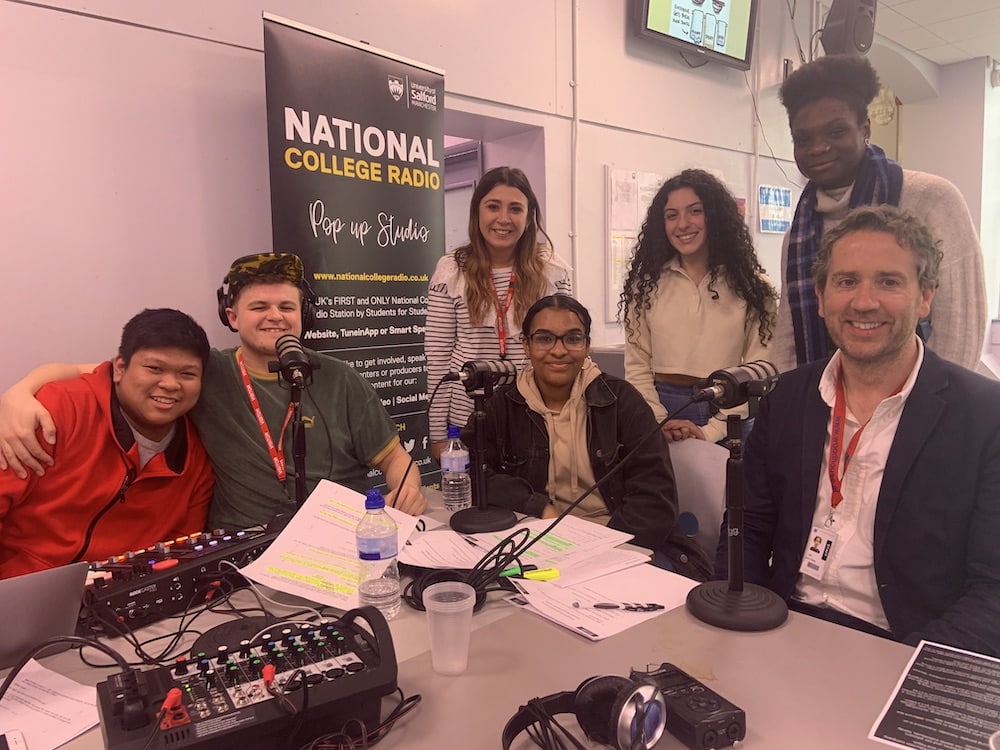SALFORD, England — A new radio station and podcast dedicated to students studying at college has launched from MediaCityUK near Manchester.
National College Radio, and its podcast “Talkback,” are run by University of Salford students, to help promote their passion for radio to a younger audience, and to develop the next generation of radio producers. The podcast focuses on social issues affecting young people around the country.
The station’s director, Jimmy Ewing, who is also a radio production lecturer at the university, explained how the idea for the station came about.
“In 2014, my son’s headteacher spoke about a lack of communication between adults and children in the school, and more widely in society, which resonated with me. I was working freelance for the BBC and also as an assessor for college radio apprenticeships, and that coincided with a week of visiting a college for work, which had their own radio station played out in communal areas,” he said.
Radio Project
“The radio was terribly uninspiring, with outdated pop and the odd announcement from an older voice reminding students what time ‘dance practice’ was in the gym — there was also a communication barrier here. So, I returned home to begin work on National College Radio, taking influence from my past working for the Prison Radio Association, which broadcasts National Prison Radio.”
Ewing explained that his work commitments got in the way, but, fast forward a few years to 2019, and the idea resurfaced at the University of Salford. “I needed a radio project for my students to work on, to give them the experience of running a community radio station.”
Ewing said that prior to the pandemic, the station’s format was simple. “We traveled the country with a pop-up radio station, delivering media production skills workshops and broadcasting live lunch-time programs in a communal space, to showcase those skills and have lots of fun,” he continued.
“We used a Rødecaster Pro as a mixer and cart-wall, using the touch pads for stings/idents/beds, with up to four Røde PodMics. We had Tascam DR-40s for vox pops, a MacBook Pro and iTunes playlist for music and pre-rec interview playout, with Broadcasting Using This Tool (BUTT) to connect to Radio.co, our streaming host. This setup was pretty much faultless, apart from the odd Wi-Fi connection issue, and we broadcast in colleges in Wales, London, Newcastle, and South and West Yorkshire.”
When the pandemic started, the station had to stop its external visits and broadcasts. “I closed the radio station down for the rest of the year, as we didn’t have the means to broadcast remotely,” said Ewing. “My student presenter/producers were isolated, and our equipment locked in the university building.”
The Relaunch
However, as the initial lockdown eased, planning for a relaunch of the station got underway with Ewing assisted by a team of University of Salford students, including Helena George and Kieron Elliott — both in their second year of studying radio production. They now run the radio station.
“We had one Rødecaster Pro at my house in Rotherham and around 15 eager students dotted around the country, armed with an array of USB microphones, mostly purchased on a student budget or bought as a Christmas present by parents,” Ewing explained.
“It was a little DIY, with Microsoft Teams for presenter feeds, and a range of playout software that was not built for radio, such as iTunes and Windows Media Player. We relaunched on March 1 this year, and have since been broadcasting three programs a day, including a daily live breakfast show. And we have launched a new podcast called ‘Talkback.’”
The station broadcasts online via its website, the TuneIn app, and smart speakers. “We use Radio.co to stream — it’s great value for money, and easily allows my student presenter/producers to broadcast live from their bedroom or kitchen,” he added.
As the station grows, Ewing wants more colleges to have a regular program, to maintain the dialogue between young people. “We’d like to keep raising awareness of important issues that matter to them,” he said.
“Most importantly, National College Radio will enable young people to learn the important role that media plays in our society, the importance of truth, and the great enjoyment found in producing radio programs and telling stories.”

